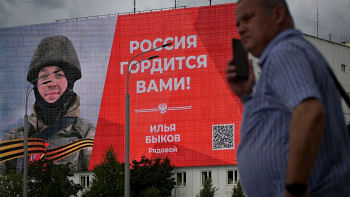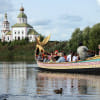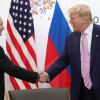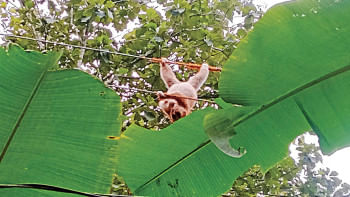Moscow terror attack and its aftermath

At around 8 pm on March 22, a horrendous terrorist attack took place at the Crocus City Hall in Krasnogorsk, just northwest outside of the city limits of Moscow, in which more than 140 people were killed and over 180 injured. Four terrorists carried out a mass shooting; some were filmed gruesomely killing unarmed citizens.
The Russian security services quickly arrested the four attackers and detained at least 12 other suspects, preventing some of them from reaching the border with Ukraine. On March 24, the four men accused of carrying out the attack appeared in a Moscow court, bandaged and battered. One entered with his partially severed ear covered—clips had circulated before on social media showing Russian servicemen cutting it off and shoving it in his mouth. Another entered in a wheelchair, with one eye swollen, his hospital gown open and a catheter on his lap—indicating the brutal handling he endured at the hands of his capturers.
In Russia's recent history, videos of torture were not made very public, said Olga Sadovskaya of the Committee Against Torture, a Russian human rights organisation. But videos of these men being tortured were found circulating widely on social media. The decision to display it so publicly, in a way that the Russian forces have not done before, was intended as a sign of revenge and a warning to potential terrorists, analysts speculated.
But regardless of how Putin and the Russians choose to respond, the attack comes as a reminder that the threat of terrorism posed by groups like the Islamic State and al-Qaeda—which have often been funded and supported by powerful countries for geopolitical gains—is still alive. With hostility, tension, and violence flaring up between powerful countries and more power vacuums being created in countries that are being used as theatres for proxy wars between superpowers, these groups can only gain more opportunities to establish their footholds, recruit greater numbers of followers and carry out bigger attacks
The last major terror attack in Russia took place in 2011. President Vladimir Putin's success in the Russian "war on terror"—including ending the Second Chechen War—has been one of his major achievements and one of the main factors behind his political longevity. Putin has been widely credited for bringing security and some semblance of order to Russia after the turbulent decade that followed the collapse of the USSR. However, this attack, which appeared shockingly easy despite the Russian capital being one of the most surveilled and guarded cities in the world, may shatter some of that confidence.
Even besides this attack, parts of the Russian population already see the period of stability, security, and economic growth that Putin has been acclaimed for as being over. War is literally at Russia's door with Ukrainian forces conducting incursions into Russian territory, sending drones to strike oil refineries and allegedly damaging Russian battleships in the strategically important Black Sea.
The attack on the Crocus concert hall, which the ISIS affiliate Islamic State in Khorasan Province (ISIS-K) has claimed responsibility for, comes while Russia's war against Ukraine continues. So, unsurprisingly, within a few hours of the attack, Putin and the head of the Russian Federal Security Service (FSB) were already linking it to Ukraine. Their claims derived from the fact that four of the suspects who had carried out the attack were detained about 140km from the Ukrainian border. In his address to the nation, Putin claimed that they had been offered an "open window" at the border, supposedly by Ukraine's security services. Ukraine, of course, denied any involvement. And US officials were also adamant that Ukraine had nothing to do with it.
A couple of days later, even though Putin said that the attack was conducted by radical Islamists, he reasserted his earlier claim of Ukraine's involvement. Putin said, "We know that the crime was committed by the hands of radical Islamists… we are interested in who ordered it." He further added, "This atrocity may be just one part in a whole series of attempts by those who have been at war with our country since 2014 [meaning the US] by the hands of the neo-Nazi Kyiv regime." Meanwhile, Russian investigators claimed that large sums of money were transferred to the Crocus City Hall attackers from Ukraine.
Interestingly, on March 7, just two weeks before the attack, the US Embassy in Russia warned that a terror attack may take place in Moscow within the next few weeks and advised US citizens in Moscow not to visit shopping malls—the Crocus City Hall was attached to a shopping mall. According to The New York Times, the current "adversarial relationship" between Washington and Moscow prevented US officials from sharing full intelligence about the terror plot. And that, too, is being seen somewhat suspiciously by the Russians.
What is worrying is that, if the Russians truly believe that Ukraine was involved—or would like to make use of such projection—the war may only get more violent in the coming days. Unverified reports have already claimed that Russia has been launching more airstrikes in parts of Ukraine following the terrorist attack. And that may jeopardise more lives and further escalate violence in Ukraine and worsen tensions between Russia and the West.
But regardless of how Putin and the Russians choose to respond, the attack comes as a reminder that the threat of terrorism posed by groups like the Islamic State and al-Qaeda—which have often been funded and supported by powerful countries for geopolitical gains—is still alive. ISIS-K, the group which has claimed responsibility for the Moscow terror attack, for example, reportedly planned some 21 attacks in nine countries in the past year, up from eight the previous year. With hostility, tension, and violence flaring up between powerful countries and more power vacuums being created in countries that are being used as theatres for proxy wars between superpowers, these groups can only gain more opportunities to establish their footholds, recruit greater numbers of followers and carry out bigger attacks.
Whether the leaders of any of these powerful countries are ready to recognise this reality and find ways of cooperation—including against terrorism—rather than confrontation in which they often use terror groups to destabilise their geopolitical rivals, remains to be seen. But it is difficult to be hopeful in that regard. After all, it was their past failures to recognise this reality that gave rise to the threat of present-day terrorism and the biggest terror groups in the first place.
Eresh Omar Jamal is deputy head of the editorial team at The Daily Star. His X handle is @EreshOmarJamal
Views expressed in this article are the author's own.
We welcome your contributions and analysis of global events. To submit articles to our weekly page, Geopolitical Insights, please send an email to [email protected]
Follow The Daily Star Opinion on Facebook for the latest opinions, commentaries and analyses by experts and professionals. To contribute your article or letter to The Daily Star Opinion, see our guidelines for submission.

 For all latest news, follow The Daily Star's Google News channel.
For all latest news, follow The Daily Star's Google News channel. 










Comments